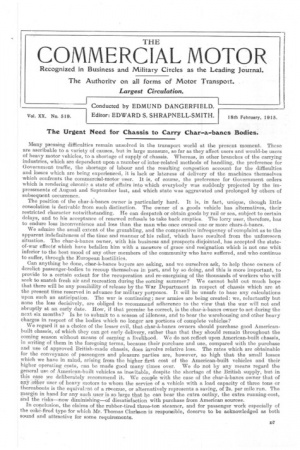The Urgent Need for Chassis to Carry Char..a-bancs Bodies.
Page 1

If you've noticed an error in this article please click here to report it so we can fix it.
Many pressing difficulties remain unsolved in the transport world at the present moment. These are ascribable to a variety of causes, but in large measure, so far as they affect users and would-be users of heavy motor vehicles, to a shortage of supply of chassis. Whereas, in other branches of the carrying industries, which are dependent upon a number of inter-related methods of handling, the preference for Government traffic, the shortage of labour and the resulting congestion account for the difficulties and losses which are being experienced, it is lack or lateness of delivery of the machines themselves which confronts the commercial-motor user. It is, of course, the preference for Government orders which is rendering chronic a state of affairs into which everybody was suddenly projected by the impressments of August and September last, and which state was aggravated and prolonged by others of subsequent occurrence.
The position of the char-a-banes owner is particularly hard. It is, in fact, unique, though little consolation is derivable from such distinction. The owner of a goods vehicle has alternatives, their restricted character notwithstanding. He can despatch or obtain goods by rail or sea, subject to certain delays, and to his acceptance of renewed refusals to take back empties. The lorry user, therefore, has to endure less inconvenience and loss than the man who once owned one or more chars-a-banes.
We admire the small extent of the grumbling, and the comparative infrequency of complaint as to the apparent indefiniteness of the time and manner of his relief, which have resulted from the unforeseen situation. The char-a-banes owner, with his business and prospects disjointed, has accepted the stateof-war effect g which have befallen him with a measure of grace and resignation which is not one whit inferior to the best mood of any other members of the community who have suffered, and who continue to suffer, through the European hostilities.
Can anything be done, -char-h-bancs buyers are asking, and we ourselves ask, to help these owners of derelict passenger-bodies to recoup themselves in part, and by so doing, and this is more important, to provide to a certain extent for the recuperation and re-energizing of the thousands of workers who will seek to snatch fresh air and recreation during the coming summer? We cannot hold out much hope that there will be any possibility of release by the War Department in respect of chassis which are at the present time reserved in advance for military purposes. It will be unsafe to base any calculations upon such an anticipation. The war is continuing; new armies are being created: we, reluctantly but none the less decisively, are obliged to recommend adherence to the view that the war will not end abruptly at an early date. How, if that premise be correct, is the char-h-bancs owner to act during the next six months? Is he to submit to a season of idleness, and to bear the warehousing and other heavy charges in respect of the bodies which no longer are portions of complete vehicles? We regard it as a choice of the lesser evil, that char-a-banes owners should purchase good Americanbuilt chassis, of which they can. get early delivery, rather than that they should remain throughout the coming season without means of earning a livelihood. We do not reflect upon American-built chassis, in writing of them in the foregoing terms, because their purchase and use, compared with the purchase and use of approved British-made chassis, does involve relative loss, The rates which are obtainable for the conveyance of passengers and pleasure parties are, however, so high that the small losses which we have in mind, arising from the higher first cost of the American-built vehicles and their higher operating costs, can be made good many times over. We do not by any means regard the general use of American-built vehicles as inevitable, despite the shortage of the British supply, but in this case we deliberately recommend it. We conple with the case of the char-k-banos owner that of way .other user of heavy motors to whom the service of a vehicle with a load capacity of three tons or thereabouts is the equivalent of a rserenue, or alternatively represents a saving, of 2s. per mile run. The wargin in hand for any such user is so large that he can bear the extra outlay, the extra running-cost, and the risks—now diminishing—of dissatisfaction with purchase from American sources. In conclusion, the claims of the rubber-tired three-ton steamer, and for passenger work especially of the coke-fired type for which Mr. Thomas Clarkson is responsible, deserve to be acknowledged as both sound arid attractive for some requirements.




















